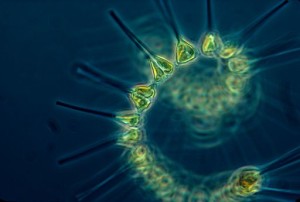May 2010
By Kevin Tsai

By NOAA MESA Project (http://www.photolib.noaa.gov/bigs/fish1880.jpg [1]) [Public domain], via Wikimedia Commons
Phytoplankton, microscopic plants that live on the surface on oceans and other bodies of water, make up the foundation of the marine food web and process over 100 million tons of carbon dioxide a day. They flourish when ocean currents mix nutrient-rich cold water from below with warmer water on the surface. Unfortunately, rising surface water temperatures are reducing the amount of mixing that occurs in tropical and sub-tropical oceans, decreasing phytoplankton production in the affected waters by 30% or more. [1]
An experiment conducted between researchers at the University of California, Santa Barbara, and the University of North Carolina at Chapel Hill suggests that ocean warming could have severe consequences for all kinds of marine life. By exposing miniaturized ocean ecosystems to warm temperatures, researchers found that while warmer temperatures initially increased phytoplankton growth, bacteria and zooplankton, microscopic animals that eat phytoplankton, spent more time feeding on phytoplankton, reducing phytoplankton numbers. As the foundation of the marine food web, a decrease in real world phytoplankton populations could cause quakes in marine food chains worldwide, such as depleting fish stocks in some regions while increasing in others. [2]
As the oceans continue to warm, the lives of people who live in coastal nations are certain to see changes in the marine life they rely on for food and export, if they have not already. While it is impossible to know exactly how climate change will affect biological life on earth, a better understanding of climate data may help us better predict and prepare for the future. Learn more about IEDRO’s data rescue efforts at http://www.iedro.org.
[1] http://www.guardian.co.uk/science/2006/dec/07/frontpagenews.conservationandendangeredspecies
[2] http://www.scientificamerican.com/article.cfm?id=how-will-warmer-oceans-affect-sea-life

Comments are closed.